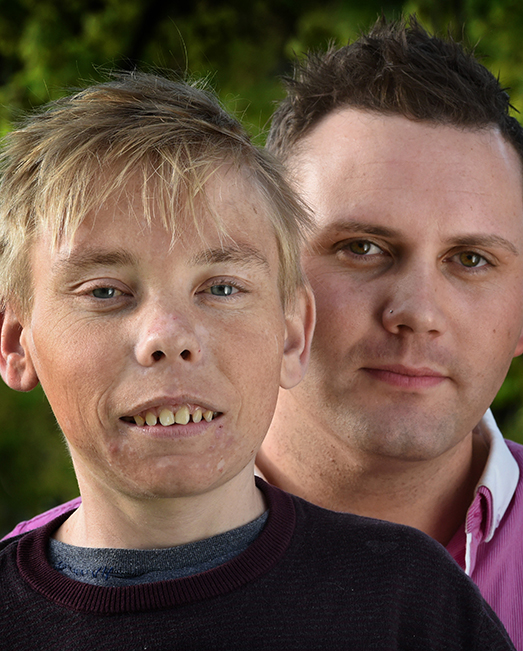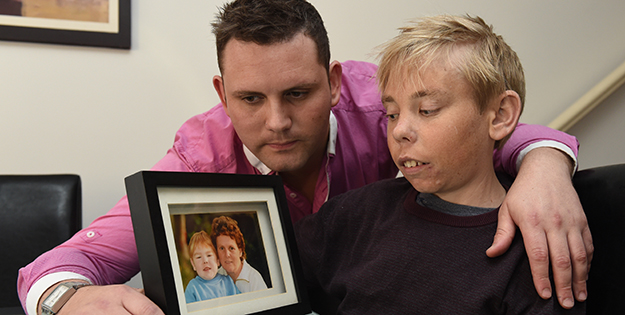Community
Copyright@ Australian Catholic University 1998-2026 | ABN 15 050 192 660 CRICOS registered provider: 00004G | PRV12008
Copyright@ Australian Catholic University 1998-2026 | ABN 15 050 192 660 CRICOS registered provider: 00004G | PRV12008

Ashton Kline was a teenager when his father set his mother alight, locked her in a caravan and left her to die. Two decades on, he’s become an advocate for children who’ve experienced extreme family violence.
A bright green memory box reminds Ashton Kline of the good times.
In amongst the handwritten letters and dog-eared holiday snaps are a few of his mother’s favourite things: a teacup, a bottle of perfume, a watch and some other jewellery.
“They’re just a few items we treasure that bring back fond memories, that we open up on Mother's Day and Christmas, so we know Mum is close,” he says.
The box also serves as a distraction from other memories, ones that are painful to relive.
When Ashton was 15 and his brother Grant was 6, their mother Viola had ended her relationship with their abusive father, but had not completely cut ties.
“Dad had been calling and really wanting Mum to go around and help him clean out a caravan that had some of Grant's toys in it,” says Ashton, now 34.
Viola agreed. She took Grant with her but Ashton stayed at home.
“Next thing I know there’s knock at the door and someone’s saying, ‘You’ve got to come down to the hospital, there’s been an accident,” he recalls. “It all went foggy from there.”
Ashton was later to learn that his father had lured his mother into the caravan, which he’d already doused in petrol. He then set her alight and left her to die.
Viola was eventually rushed to hospital and continued to live for a few hours, but ultimately succumbed as a result of the burns.
The teenage Ashton struggled to comprehend what had happened.
“Imagining the pain and suffering she went through in those hours is probably one of the hardest things for me,” he says.
“I decided to view her body, and that image of my mother with 99 per cent burns all over her, I think it will haunt me for the rest of my life.
“But it was something that I chose to do, I guess, for a sense of reality. I just couldn't believe at that point that my mother, who had walked out the door that morning, was gone. I had to see it to believe it.”
The trauma of losing his mother in such devastating circumstances will never leave Ashton Kline, nor will the years of abuse he suffered at the hands of his father.
At any time, the memories flood back to him: his dad dragging his mum down the driveway; hiding under his bed in fear of this violent man he lived with.
“One of my earliest memories of violence goes back to when I was five or six, when Dad held a knife to our throats — both my mum and myself — and threatened to kill us,” he says.
“I wanted to protect Mum as much as I possibly could, but I was so scared. I remember nights not sleeping because I was worried he’d come home really angry, and also that feeling of being trapped and powerless. What do you do as a six-year-old in that situation?”
In the days and weeks after Viola’s death, Ashton’s main concern was caring for his brother Grant, who had witnessed the crime.
“I remember him needing me to hold him at night and both of us just crying arm-in-arm,” he says.
“The trauma for Grant of witnessing that, still to this day I see him as that vulnerable child that I need to protect and nurture, to make sure it doesn't ruin him.”

Fortunately, Ashton and Grant had some help.
After being placed in foster care, the brothers were provided with emotional and financial support from the Alannah & Madeline Foundation, a charity that cares for children who’ve experienced or witnessed serious violence.
“They assigned us with a case worker who helped us to navigate the maze we faced, and they really worked hard to keep us together,” says Ashton, the primary carer for Grant, who has end-stage kidney failure.
Now, almost two decades on, Ashton is an ambassador for the Foundation.
As a survivor of family violence, he sees it as his calling to advocate for the tens of thousands of children in a similar situation.
In his role as a Nursing Lecturer at ACU’s Ballarat Campus, he recruits students to volunteer for the foundation, creating backpacks filled with essential items for kids who find themselves in emergency accommodation.
“The ‘Buddy Bag’ program is set up for young kids like Grant and I, who are uprooted from their homes and are left with nothing,” Ashton says.
“It provides these kids with tangible items that give them some sort of comfort: a teddy bear, a picture frame, a toothbrush, pyjamas and things like that.”
Ashton and Grant’s father was sentenced to 15 years in prison for their mother’s murder. He died two years into his sentence.
In the court case, it was revealed he had boasted to many in their close-knit community of his plans to murder Viola.
“He told everyone who’d listen what he’d planned to do, but no one had thought to warn her or notify the police … they just viewed my father as a bit of a nobody with a mental health issue,” Ashton says.
“That’s one of the biggest things I’d like to come from the work I do with the foundation, that if you see or witness anything that suggests family violence is occurring or about to occur, you should speak up.”
Looking back, he sometimes wonders how he got through.
“At some stage, I consciously said to myself, ‘Do I want this to destroy me, or do I want to use this to fuel my journey?’” he says.
“I made my choice, and I think my trauma has definitely fuelled me. It fuels my work in nursing and the work I do with the foundation, and I hope it shows others that you can break the cycle of abuse and forge an identity that’s not damned by your past experiences.”
As well as that message of hope, Ashton is keen to break down the stigma surrounding women who stay in violent relationships.
“I think there’s this idea they should’ve just left the relationship, and that by staying, it means they’re weak,” he says.
“My mother put up with violence, aggression and assault for 19 years, all for the sake of her children. She was a stay-at-home mother, who had no income and relied solely on my father for financial support, and she bore the brunt of that violence until it turned towards us children.
“That's when she decided it couldn't go on any longer, and she needed to get us kids out.”
He sees her actions as “a great example of strength and courage”.
“I carry that image of my mum, and in some small way, I think sharing my story gives meaning and purpose to her death,” Ashton says.
“It means her legacy lives on.”
To donate to the Alannah and Madeleine Foundation, visit amf.org.au.
Want to learn more about Community Engagement at ACU? Check out our website.
Copyright@ Australian Catholic University 1998-2026 | ABN 15 050 192 660 CRICOS registered provider: 00004G | PRV12008